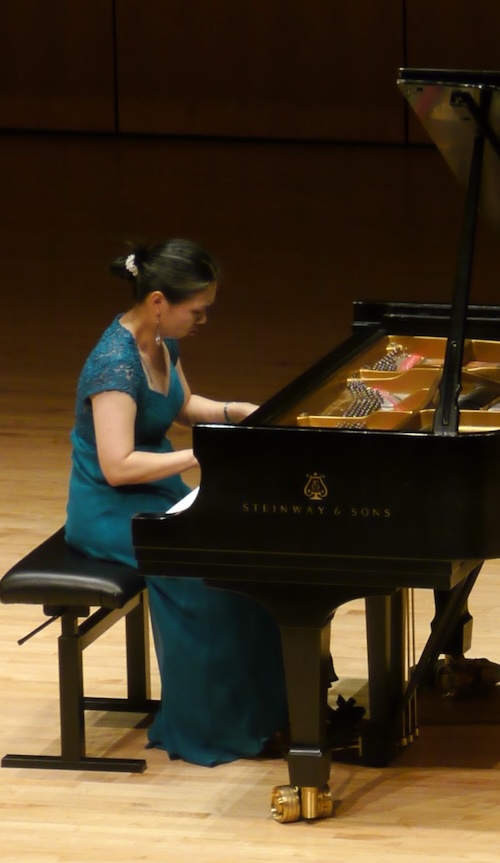Pianist Chen tackles the “Hammerklavier” with power and fluidity at UMBC

Hua-Chuan Chen performed a recital titled “Beethoven Reimagined” Sunday at Linehan Hall. Photo: Jeremy Keaton
Pianist Hui-Chuan Chen set herself no small task in making Beethoven’s “Hammerklavier” sonata the centerpiece of her Sunday recital at Linehan Concert Hall on the University of Maryland Baltimore County campus.
As Chen, a UMBC faculty member, aptly stated, this colossal piece is a Mt. Everest of the keyboard repertory. The Op. 106 sonata is in many ways a triumph of the human spirit. Beethoven composed it after a five-year composing near-hiatus as he was buffeted by loss of hearing, the collapse of his romantic hopes with the Immortal Beloved, chaotic litigation over custody of his nephew, and the fickle Viennese musical tastes that now lionized Rossini.
The piece ushers in Beethoven’s final musical period, with its intimations of the Ninth Symphony, and a slow movement for which words like “profound” and “sublime” are painfully inadequate. The finale, a savagely complicated fugue is daunting. In the end, the sonata epitomizes Artur Schnabel’s dictum that there are some pieces that are better than they can be played.
Hui-Chuan Chen was more than up to the work’s manifold challenges. Her finale—the fantastically difficult fugue— was especially well done, taken at a tempo within striking distance of Beethoven’s insanely fast metronome marking. The pianist made the movement both intelligible and exciting, with buzzing 16th-note figures, creating terrific momentum without being overpowering. Indeed, her playing had a highly appealing fluidity, with the many rapid passages flowing naturally, without ever sounding labored.
Her opening movement captured lyric qualities of the piece that sometimes get downplayed. Textures were clear throughout and the climax of the development section, where big chords are volleyed back and forth in a high register, came off splendidly.
On the debit side, Chen took a few too many rhetorical pauses, as at the outset of the opening theme of the finale (and an even bigger one on the repeat) that went against the plunging-right-in shock of that celebrated start.
Also the crown jewel slow movement was on the quick side, and some of the movement’s vocal aspects were slightly underplayed (the florid figurations that follow the opening theme, for example, needed to be more operatic). But Chen kept the music moving forward and it never sounded too long. Her full, unforced sound also had plenty of nuance. Chen had the tonal control to exquisitely float Beethoven’s celestial move to a Neapolitan G major at each of its appearances.
As a curtain-raiser to her “Beethoven Reimagined” program, Chen performed Daniel Pesca’s Impromptu #2 (“after Beethoven”). Dedicated to her, Pesca’s work contains an overt reference to the opening of Op. 106. His piece has a nebulous harmonic language and is appealing and was skillfully played. On a first hearing, though, the piece seemed to meander.
The audience sat rapt throughout the entire concert, without a single cough or paper rustling, a tribute to Chen’s artistry.
Steven Silverman is a pianist and harpsichordist. He and his wife, the violinist and violist Nina Falk, are co-founders of the Arcovoce Chamber Ensemble, now in its 26th season.



